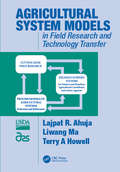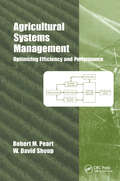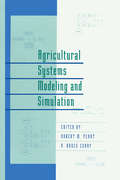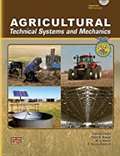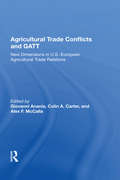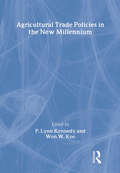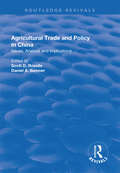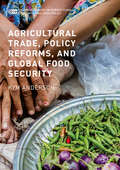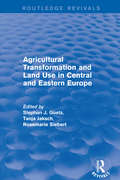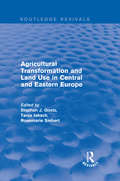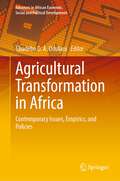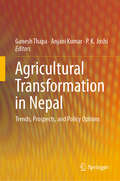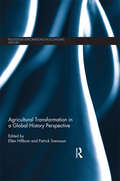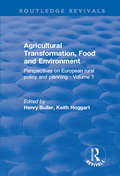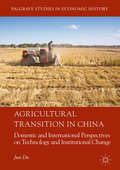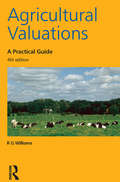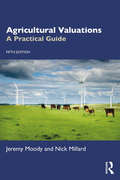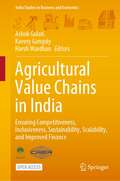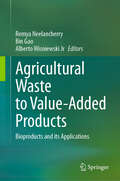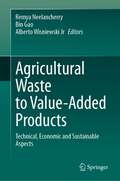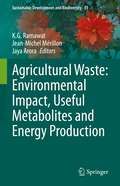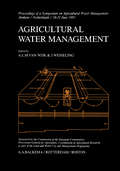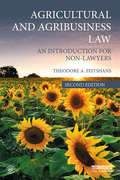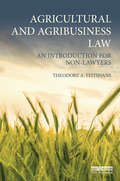- Table View
- List View
Agricultural System Models in Field Research and Technology Transfer
by Liwang Ma Lajpat R. Ahuja Terry A. HowellMost books covering the use of computer models in agricultural management systems target only one or two types of models. There are few texts available that cover the subject of systems modeling comprehensively and that deal with various approaches, applications, evaluations, and uses for technology transfer. Agricultural System Models in Field Res
Agricultural Systems Management: Optimizing Efficiency and Performance
by Robert M. Peart; W. David ShoupRunning a productive agriculture system has always been about having the right tools and the know-how to pursue optimization and efficiency. In the 21st century, the case can be made that the agriculturist's most important tool is not the cultivator, but the computer. While you still need to know how to adapt to the day-to-day challenges of land an
Agricultural Systems Modeling and Simulation (Books in Soils, Plants, and the Environment)
by Robert M. Peart R. Bruce CurryOffers a treatment of modern applications of modelling and simulation in crop, livestock, forage/livestock systems, and field operations. The book discusses methodologies from linear programming and neutral networks, to expert or decision support systems, as well as featuring models, such as SOYGRO, CROPGRO and GOSSYM/COMAX. It includes coverage on evaporation and evapotranspiration, the theory of simulation based on biological processes, and deficit irrigation scheduling.
Agricultural Technical Systems And Mechanics
by B. J. Moniz Leonard Koel R. Bruce Radcliff Glen A. MazurAgricultural Technical Systems and Mechanics helps prepare individuals for the agricultural mechanics work environment through the application of problem-solving skills and a basic knowledge of agricultural machinery and equipment repair and maintenance. This well-illustrated textbook also presents the proper use of hand tools and power equipment, the construction and maintenance of agricultural structures and fencing, the operation of plumbing and irrigation systems, and the principles behind mechanical, electrical, solar, and wind power. The interactive DVD included with the book features learning tools that reinforce and enhance content knowledge and skills.Agricultural Technical Systems and Mechanics addresses the primary knowledge and skills required for success in the Power, Structural and Technical Systems (PST) career pathway as identified in the National Agriculture, Food and Natural Resources (AFNR) Career Cluster Standards. Technical knowledge and skills as well as communication, teamwork, and leadership skills enable individuals to participate in the FFA® agricultural mechanics career development event (CDE).
Agricultural Trade Conflicts And Gatt: New Dimensions In U.s.-european Agricultural Trade Relations
by Giovanni AnaniaAgricultural trade, always a source of international friction, will remain a contentious issue in the years to come. The GATT agreement achieved only partial trade liberalization; recognizing this, the agreement calls for a continuation of the negotiation process to achieve the long-run goal of a “substantial reduction in agricultural support and protection.†In any case, it is clear that U.S.-European Union (EU) agricultural trade relations will remain central to any future negotiation. In this volume, leading experts present a comprehensive set of analyses of the U.S.-EU agricultural trade conflict. The discussions provide a unique perspective on the U.S.-EU agricultural trade confrontation in recent years and offer insights into both the final GATT agreement and forthcoming agricultural issues. Presenting a broad historical context, the book focuses on changes in U.S. and European trade and agricultural policies, looking at the implications of these changes for bilateral relations and global agricultural markets. Providing U.S., EU, and third-party perspectives, the contributors analyze the negotiation process in the Uruguay Round of the GATT. Finally, the book explores several additional dimensions of the U.S.-EU agricultural trade conflict, including the consequences of the EU integration and enlargement processes, the environmental impact of the Union’s agricultural policies, and the mechanisms and forces that determine agricultural policy formation in both the United States and in Europe.
Agricultural Trade Policies in the New Millennium
by P. Lynn Kennedy Andrew D O'Rourke Won W KooFace the challenge of change in the global agricultural trade market!This insightful book presents a comprehensive overview of the trade situation facing agriculture in the 21st century. This esteemed collection of the field?s foremost researchers evaluates anticipated changes to the agricultural trade market and the competitiveness of commodities and products resulting from existing and potential international policies. Agricultural Trade Policies in the New Millennium provides an in-depth understanding of multilateral trade negotiations (past, present, and future) and the impact of regionalism on agricultural trade. It also analyzes trade issues specific to individual commodities, such as rice, wheat, and cotton.Agricultural Trade Policies in the New Millennium consolidates essential trade research into a one-of-a-kind reference source for economists, academics, and agriculture professionals. The book provides a detailed overview of current and potential trade situations, divided into three concise sections: key issues influencing trade negotiations from the perspective of developed and developing countries and the environment; commodity trade and trade policy issues concerning competitiveness and the international policy environment for coarse grains, cotton, rice, sugar, and wheat; and general issues related to multilateral and regional trade agreements, including policy tools within the World Trade Organization, anti-dumping actions, regionalism, price volatility, and the macroeconomic effects of trade liberalization. Agricultural Trade Policies in the New Millennium examines: key issues influencing trade negotiations commodity trade and trade policy issues issues and concerns related to multilateral and regional trade negotiations challenges facing trade policy prospects for the agricultural sector in the new millennium With international policy issues like the WTO’s Millennium Round and the Free Trade Area of the Americas (FTAA) in negotiation and a new United States farm bill pending, Agricultural Trade Policies in the New Millennium provides much-needed textbook analysis by expert researchers. This vital book will keep you in touch with current trade negotiations and policy decisions that are certain to hold major implications for the agricultural sector.
Agricultural Trade and Policy in China: Issues, Analysis and Implications (The Chinese Trade and Industry Series)
by Ian Long Scott D. RozelleThis title was first published in 2003. This prominent and commanding volume collates the best research available on China's agricultural trade. Critically analyzing the agricultural supply and demand factors that underlie trade patterns such as agricultural productivity and policy, it also explores China's agricultural trade and policy including implications for China and elsewhere. Long term issues and productivity growth are taken into consideration, as are specific issues such as WTO accession. The slate of authors combines the leading established scholars in the field and the best of the next generation, including those from China and the West.
Agricultural Trade, Policy Reforms, and Global Food Security (Palgrave Studies in Agricultural Economics and Food Policy)
by Kym AndersonThis book explores the potential for policy reform as a short-term, low-cost way to sustainably enhance global food security. It argues that reforming policies that distort food prices and trade will promote the openness needed to maximize global food availability and reduce fluctuations in international food prices. Beginning with an examination of historical trends in markets and policies, Anderson assesses the prospects for further reforms, and projects how they may develop over the next fifteen years. He pays particular attention to domestic policy changes made possible by the information technology revolution, which will complement global change to deal directly with farmer and consumer concerns.
Agricultural Transformation and Land Use in Central and Eastern Europe
by Stephan J. Goetz Tanja JakschThis title was first published in 2001. By presenting research from a multi disciplinary perspective, this book will serve as an important reference tool for researchers and others interested in the land use issues of Central and Eastern Europe as well as agribusiness leaders seeking potential trading relations with and within these European countries.
Agricultural Transformation and Land Use in Central and Eastern Europe
by Stephan J. Goetz Tanja JakschThis title was first published in 2001. By presenting research from a multi disciplinary perspective, this book will serve as an important reference tool for researchers and others interested in the land use issues of Central and Eastern Europe as well as agribusiness leaders seeking potential trading relations with and within these European countries.
Agricultural Transformation in Africa: Contemporary Issues, Empirics, and Policies (Advances in African Economic, Social and Political Development)
by Gbadebo O. A. OdularuThis book offers new insights into the ongoing agricultural transformation in Africa. Presenting case studies, macro-level simulations, and relevant surveys, it analyzes food crops and agri-food policy challenges and their implications in various African countries. In addition, it discusses how current African agri-food policies could be improved to achieve the continental vision of sustainable development in light of the African Union’s Agenda 2063. The respective contributions address topics such as drivers of technical efficiency among smallholder maize farmers; farm management practices; agri-food infrastructure policies; food security; agricultural growth; and financing for and investment in agricultural production. Accordingly, the book appeals to scholars of economics and agricultural studies and to anyone interested in the agricultural transformation of Africa.
Agricultural Transformation in Nepal: Trends, Prospects, and Policy Options
by P. K. Joshi Ganesh Thapa Anjani KumarThis book addresses some key strategic questions related to agriculture in the context of major contemporary developments and emerging challenges in Nepal such as the changing role of agriculture with economic growth, structural transformation in reducing poverty, improving nutritional outcomes, and addressing the challenges of climate change. The book also suggests policy measures to improve the delivery of critical inputs and services and ensure the participation of marginal and smallholders in high-value chains. Further, it discusses how the new federal system and governance structure will affect the delivery of agricultural technology and services. The book is divided into five parts. Part I discusses macro-issues in the agriculture sector, while Part II focuses on agricultural productivity growth and its main drivers. The third part explores diversification in the agricultural and non-agricultural sectors by farmers and other rural people for livelihood improvement, while the fourth part deals with agricultural trade and marketing issues, highlighting policy implications and recommendations in the areas of immediate focus and further research. Lastly, Part V addresses institutions and governance issues, which are vital for agricultural development. In the final chapter, the editors summarize and synthesize the book’s main findings and develop a policy agenda for addressing the many challenges faced by the agriculture sector in Nepal, so as to make it more productive, competitive, sustainable, and inclusive. The book offers a rich source of analytical information on various aspects of agricultural development in Nepal and will be of immense value to policymakers, development partners, civil society, students, and those interested in the economic and agricultural development of not only Nepal, but also other developing countries.
Agricultural Transformation in a Global History Perspective (Routledge Explorations in Economic History)
by Ellen Hillbom Patrick SvenssonHistory teaches us that agricultural growth and development is necessary for achieving overall better living conditions in all societies. Although this process may seem homogenous when looked at from the outside, it is full of diversity within. This book captures this diversity by presenting eleven independent case studies ranging over time and space. By comparing outcomes, attempts are made to draw general conclusion and lessons about the agricultural transformation process.
Agricultural Transformation, Food and Environment: Perspectives on European Rural Policy and Planning - Volume 1 (Routledge Revivals)
by Keith Hoggart Henry BullerThis title was first published in 2001. An interdisciplinary team of leading European scholars bring together case studies from Western and Eastern Europe to illustrate and critically analyze the shifting relationships of agricultural, environmental and food policy in Europe. In the most comprehensive book of its kind it examines the critical changes, both in agricultural, environmental and food politics and the way these domains have been investigated by European social scientists. The book evaluates specific changes, focussing in particular on agricultural restructuring (in the face of globalization, Europeanization and the collapse of the Soviet model of agricultural organization), agriculture-environmental relations and consumer preferences. Beginning by examining the degree to which Europe offers a unique and identifiable rural experience, the book includes a critical re-examination of the process of agricultural transformation. In the light of contemporary events and the over-seductive and essentially mythical notion of post-productivism.
Agricultural Transition in China: Domestic And International Perspectives On Technology And Institutional Change (Palgrave Studies In Economic History)
by Jun DuDeepens readers’ understanding of the nature of contemporary Chinese economic development .<P><P> Relaxes the hypothesis of the perfect market condition to discuss institutional and technological changes in Chinese post-reform agriculture under the complex market institution.<P> Highlights the decisive role of market institutions in determining the selection and transition of agricultural technologies.<P> This book extends current research on the political economy of modern China, with particular regard to agricultural development and its role in economic transition. It uses Neoclassical principles to re-interpret agricultural growth and technological change under complex market institutions with empirical studies on China and selected East Asian economies. The text also questions how technological advances in China contribute to the Great Divergence debate.<P> Through a comparative analysis of agricultural technical changes in the planting of rice paddies in Japan, Taiwan and China, Du finds that different market institutions and structures have given rise to considerable diversity of agricultural change between different economies in terms of the nature, timing and duration of technological transition. Such diversification has, in turn, affected the trajectories of agricultural and wider economic growth.<P> Here, Du reflects on the nature of contemporary Chinese economic development and extends observations on agricultural transition to the entirety of Asia, finding that the nature, timing, and time-span of agriculture technology transitions have varied considerably across different economies. <P>
Agricultural Valuations
by R.G. WilliamsAgricultural Valuations, now in its fourth edition is written by a practising agricultural valuer who has been working in property for over 50 years. His analysis updates recent changes to tenant right valuations, improvements, fixtures, milk quotas and dilapidations. The author uses numerous example claims and valuations which shed light on recent pipeline and electricity line wayleave claims, notices to remedy breaches, together with probate, income tax and compulsory purchase valuations. Further chapters deal with the guiding principles of how to correctly value farms, assess farm rents, carry out arbitrations, inventories and records of condition. valuation clauses on sales of farms, livestock, soils, management agreements, valuation in court proceedings and a glossary of useful information. This practical, but detailed title will be invaluable to students, agricultural valuers and land agents who are looking to be kept apprised of up to date best practices. The author was awarded the ‘Kenneth Glenny’ Prize by the Central Association of Agricultural Valuers when the first edition was published in 1984. Since then the book has been expanded brought up to date to reflect changes that have occurred to rural communities.The author, a member of a North Wales farming family, was Senior Partner of Coles Knapp and Kennedy, Ross-on-Wye. An experienced farmer himself, he keeps cattle and sheep, grows arable crops and also grows cider apples and hops in Herefordshire. He was involved for over 25 years in training candidates for the examination of the Central Association of Agricultural Valuers and for many years the RICS TPC in agricultural practice.
Agricultural Valuations: A Practical Guide
by Jeremy Moody Nick MillardAgricultural Valuations: A Practical Guide has long been the standard text for students and professionals working on agricultural valuations. Taking a practical approach, it covers all the relevant techniques and legislation necessary to correctly value farms, assess farm rents, carry out arbitrations, inventories and records of condition, including valuation clauses on sales of farms, livestock, soils, management agreements, valuation in court proceedings and a glossary of useful information. In this fifth edition, Gwyn Williams's original text is taken on by Jeremy Moody and Nick Millard, renowned experts in the field, bringing the book right up to date to reflect recent changes in the rural economy, including development, diversification and renewable energy and specialist valuations and reference to all the latest legislation. Clear and accessible to students and professionals alike, readers will find Agricultural Valuations an invaluable guide to best practice in agricultural valuations.
Agricultural Value Chains in India: Ensuring Competitiveness, Inclusiveness, Sustainability, Scalability, and Improved Finance (India Studies in Business and Economics)
by Harsh Wardhan Ashok Gulati Kavery GangulyThis open access book provides a clear holistic conceptual framework of CISS-F (competitiveness, inclusiveness, sustainability, scalability and access to finance) to analyse the efficiency of value chains of high value agricultural commodities in India. It is based on the understanding that agriculture is an integrated system that connects farming with logistics, processing and marketing. Farmer’s welfare being central to any agricultural policy makes it very pertinent to study how a value chain works and can be strengthened further to realize this policy goal. This book adds value to the existing research by studying the value chains end-to-end across a wide spectrum of agricultural commodities with the holistic lens of CISS-F. It is not enough that a value chain is competitive but not inclusive or it is competitive and inclusive but not sustainable. The issue of scalability is very critical to achieve macro gains in terms of greater farmer outreach and sectoral growth. The research undertaken here brings out some very useful insights for policymaking in terms of what needs to be done better to steer the agricultural value chains towards being more competitive, inclusive, sustainable and scalable. The value chain specific research findings help draw very nuanced policy recommendations as well as present a big picture of the future direction of policy making in agriculture.
Agricultural Waste to Value-Added Products: Bioproducts and its Applications
by Bin Gao Remya Neelancherry Alberto Wisniewski JrThis book provides awareness about utilizing the agricultural waste to assist sustainable development goals (SDGs) through the adaptation of such waste-to-energy technologies. It discusses the synthesis, characterization, and environmental utilization of biofuels produced from agriculture-derived wastes. The application of circular economy, insights and opportunities of recent issues, and ideas for the potential enhancement of agricultural waste-derived products are also explored. About a third of all biomass waste is produced by agriculture, making it one of the largest contributors to global biomass waste. Different biochemical and thermochemical processes can transform this waste into a wide range of value-added products. Such biomass-to-biofuel trends have gained a prominent status in the global energy system. And the agro-waste-derived products can provide potential solutions to a wide range of environmental problems. The primary audience shall be academicians, researchers, engineers, scientists, and managers working in the field of agricultural residue management and waste biomass to energy.
Agricultural Waste to Value-Added Products: Technical, Economic and Sustainable Aspects
by Bin Gao Remya Neelancherry Alberto Wisniewski JrThis edited book provides a comprehensive review of the current agricultural waste disposal techniques focusing on the ongoing research in the production of various agro waste-derived value-added products. Further topic includes the techno-economic aspects in up-scaling the technology from lab scale to commercial/pilot scale. Sustainable waste management and alternative renewable energy sources are the most important requirements in this era of rapid industrialization and urbanization. Agricultural waste, which is one of the major contributors to overall waste production, has the ability to be an essential source of renewable energy and other valuable products. The ongoing research and technical advancements in agro-waste treatment lead to the efficient conversion of waste into different value-added products. This book is of primary interest to academicians, researchers, scientists and engineers working in the field of agro-residue management, and biomass to bio-energy conversion technologies. Also, the book serves as reading material for students of Environmental Engineering/Civil and Environmental Engineering and Agricultural Engineering. Rural Management authorities, Industrial and Government policy-making agencies may also find it useful read.
Agricultural Waste: Environmental Impact, Useful Metabolites and Energy Production (Sustainable Development and Biodiversity #31)
by K. G. Ramawat Jean-Michel Mérillon Jaya AroraThis contributed volume deals with problems associated with huge biomass generated by crop plants and the processing of fruits and food materials. The main focus is to address problems associated with organic residues from agro-industrial processes. This book aims to provide a comprehensive and up-to-date account of various processes involved in the valorization of this huge biomass available from agro-industrial processes and obtaining valuable primary and secondary metabolites which will have an impact on the rural economy. Decrease in forest cover associated with the production of agriculture-based waste resulting in pollutants like smoke by burning of residual crops, waste from breweries, food processing, pruning of bushes and trees, and from industries producing proteins, vegetable oils and fruit juices etc.This book is of interest to teachers, researchers, climate change scientists, agriculture scientists and policymakers. The book brings out the latest reading material for botanists, biotechnologists, environmentalists, biologists, policymakers and NGOs working for environmental protection.
Agricultural Water Management
by A. L. Van Wijk Wesseling J.This book is an outcome of the symposium on agricultural water management in Netherlands and discusses the methods that leads to cost effective but environmentally acceptable techniques. The book covers following topics: drainage and reclamation of soil and effect of drainage on agriculture.
Agricultural Water Management: Proceedings of a Workshop in Tunisia
by National Research Council of the National AcademiesThis report contains a collection of papers from a workshop---Strengthening Science-Based Decision-Making for Sustainable Management of Scarce Water Resources for Agricultural Production, held in Tunisia. Participants, including scientists, decision makers, representatives of non-profit organizations, and a farmer, came from the United States and several countries in North Africa and the Middle East. The papers examined constraints to agricultural production as it relates to water scarcity; focusing on 1) the state of the science regarding water management for agricultural purposes in the Middle East and North Africa 2) how science can be applied to better manage existing water supplies to optimize the domestic production of food and fiber. The cross-cutting themes of the workshop were the elements or principles of science-based decision making, the role of the scientific community in ensuring that science is an integral part of the decision making process, and ways to improve communications between scientists and decision makers.
Agricultural and Agribusiness Law: An Introduction for Non-Lawyers
by Theodore A. FeitshansThis introductory textbook provides an overview of the concepts necessary for an understanding of agricultural and agribusiness law. The text will help students of land-based industries with little or no legal background to appreciate and identify issues that may require referral or consultation with legal counsel. This new edition is fully revised and updated, particularly addressing developments in taxation and trade, and includes a new chapter on criminal law, an area of increasing relevance to agriculture. Each concise chapter addresses a different legal issue that those employed in agriculture and agribusiness may face, and both federal law and representative examples of state law are included. In addition to traditional topics such as contracts, property law, and estate planning, the book also covers more contemporary issues such as organic certification, animal law, genetically engineered crops, and food safety. Agricultural law extends beyond those directly engaged in farming to those in agribusiness who provide services and inputs to farmers, buy farmers’ products, store or transport products, manufacture food products and serve as intermediaries between farmers and consumers. The book will, therefore, also serve as a reference and a guide for those employed in agribusiness and agriculture.
Agricultural and Agribusiness Law: An introduction for non-lawyers
by Theodore A. FeitshansThis introductory textbook provides an overview of the concepts necessary for an understanding of agricultural and agribusiness law. The text will help students of land-based industries with little or no legal background to appreciate and identify issues which may require referral or consultation with legal counsel. Each concise chapter addresses a different legal issue that those employed in agriculture and agribusiness may face, and both federal law and representative examples of state law are included. In addition to traditional topics such as contracts, property law and estate planning, the book also covers more contemporary issues such as organic certification, animal law, genetically engineered crops and food safety. Agricultural law extends beyond those directly engaged in farming to those in agribusiness who provide services and inputs to farmers, buy farmers’ products, store or transport products, manufacture food products, and serve as intermediaries between farmers and consumers. The book will therefore also serve as a reference and a guide for those employed in agribusiness as well as agriculture.
